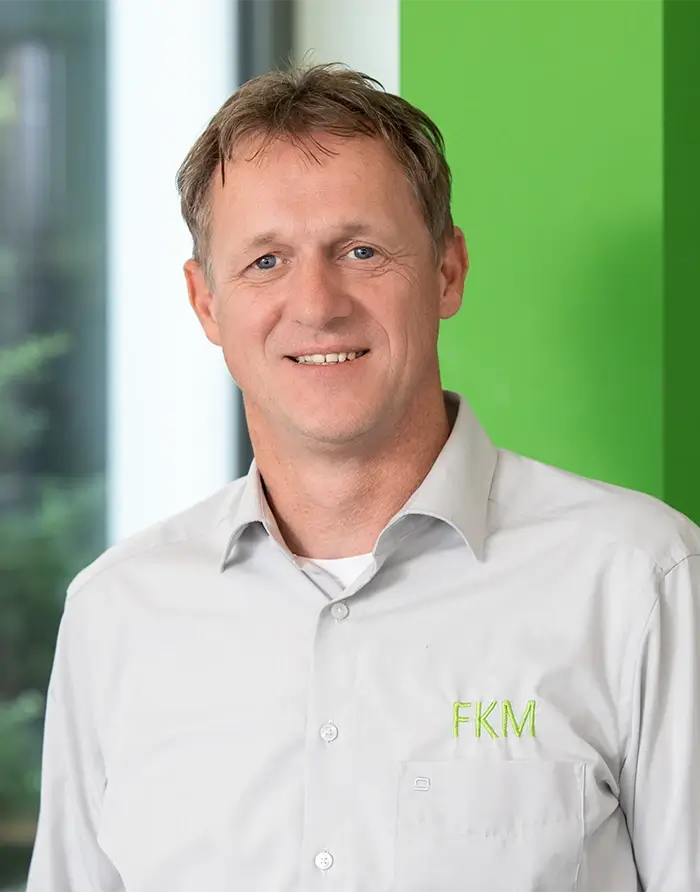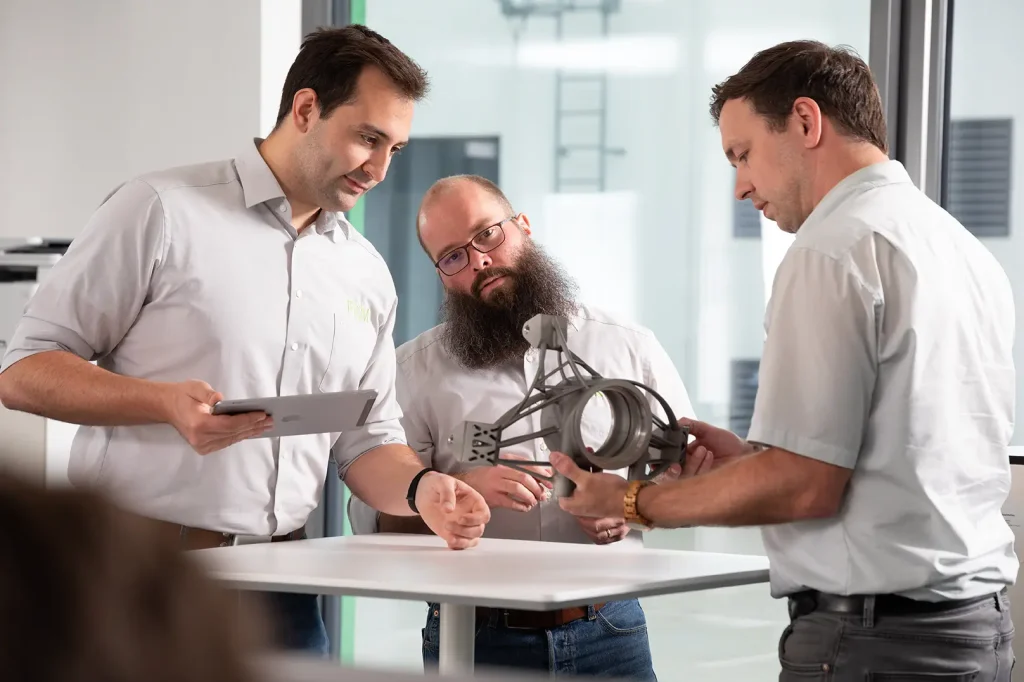Startseite » 3D printing & services » Areas of Application & Advantages » Spare parts and serial parts on demand
Additively manufactured series components and spare parts are often installed in visible positions. As a result, their aesthetics must meet the same requirements as components manufactured using other processes. After developing and implementing 3D printing processes for more than 30 years, FKM offers a wealth of experience and numerous special systems for component finishing.

June 7, 2022
As one of the first German companies from the technology sector of additive manufacturing, FKM has now been meeting the strict requirements of the automotive standard IATF 16949 for several weeks. Our compliance with this standard makes the laser sintering specialist one of the top suppliers of serial parts for the international automotive industry. In this interview, Stefan Behlert, Head of Quality Assurance at FKM, talks about the concrete impacts that the standard has on the company’s day-to-day business.
Mr Behlert, FKM has been meeting the criteria of ISO 9001:2015 and ISO 14001:2015 for quite some time. Why have you now also had your quality management certified according to the high requirements of IATF 16949:2016?
Behlert: Doing so enables us to meet a central demand made by all well-known car manufacturers. The certification according to IATF 16949 qualifies our laser sintering factory in the German town of Biedenkopf as a production facility for manufacturing sophisticated series and spare parts for the automotive industry. As a result, we are no longer only one of the leading manufacturers in the field of additive manufacturing but also probably the first German 3D printing supplier to be listed as a Tier 3 supplier of individual components in OEM circles. The new IATF certification therefore gives us a significant competitive advantage.

What is the basic principle of the requirements of IATF 16949?
Behlert: While ISO 9001 applies across all industries and describes rather general minimum standards for a quality management system, the requirements of IATF 16949 are typically oriented towards the automotive industry and follow the principle of risk management. This reflects the expectations of the major automotive manufacturers, which demand a differentiated and industry-specific QM system based on consistent risk and process orientation as well as comprehensive CIP measures from their suppliers. The stringent avoidance of waste and errors plays a significant role in such demands. Certification according to IATF 16949 clearly indicates to the OEM that the series supplier has its processes under control and has a complete understanding and command of every aspect involved. For us, this certification represents a key strategic step on our journey to becoming an automotive series manufacturer.
FKM has been supplying laser-sintered components made of engineering plastics to customers in the automotive industry for quite some time. What will change now as a result of the IATF certification?
Behlert: We have indeed been working for a number of large system suppliers and OEMs at the level of product development and pre-series production for a number of years. However, as a supplier of small and medium-sized series for automotive applications, we have so far only been able to assert ourselves in exceptional cases, for example with special components made of PA 11, PA 12, PA 6 or TPU. With the certification of our quality management according to IATF 16949, we are now proving that we have the fully-fledged system and process quality of a modern automotive series manufacturer. As a result, we are a trustworthy partner that meets the customer-specific requirements of the OEMs.
What impact does the IATF catalogue of measures have on FKM’s day-to-day business?
Behlert: In detail, the provisions of IATF 16949 go far beyond those of ISO 9001. The adaptation of our previous QM system and its expansion according to the extended specifications already ready involved a huge additional package of tasks, which kept our team extremely busy for about twelve months until the certification at the end of April this year. At the moment, everything revolves around implementing the process and work descriptions in accordance with the standard in our day-to-day operations.
What does this mean in concrete terms?
Behlert: This means, for example, that some employees have to follow new processes, we have to comply with an increased documentation and verification obligation, we are required to adhere to the requirements of a stricter performance evaluation, we need to be even more observant when it comes to detecting potential sources of error and much more. Throughout the company, we are now focusing on actively implementing the new standard and the corresponding processes described. The realisation that many of the IATF-related changes at FKM have already led to significant process improvements and simplifications helps to facilitate and accelerate this implementation.
Can you illustrate this with some examples?
Behlert: Even during the introductory phase, we noticed that we were achieving greater transparency in our key figures. As a result, many processes in production and administration can now be better controlled, and we can react to market changes and customer requirements more flexibly. It is also very noticeable that our error transparency has already improved significantly, which enables us to eliminate deficiencies and deficits much more effectively than was previously possible. I am sure that further positive effects will soon become visible. Supply bottlenecks are likely to be ruled out in the future, the use of materials will continue to improve, and the number of errors is likely to be further reduced. On the whole, our processes will improve in terms of both transparency and stability.
How long will your current IATF certification remain valid?
Behlert: In principle, the certification, which was completed in April, is initially valid for three years. Its validity will be confirmed annually by an accredited company – until we are required to have our quality management system fully recertified in 2025.
Mr Behlert, thank you for the interview.
of 3D printed serial parts on-demand

Both manufacturers and end customers benefit from the production of on-demand serial parts using 3D printing. By combining 3D printing technology with traditional manufacturing methods, companies become much more flexible and can deal with changing demands and requirements more efficiently.
of 3D-printing spare parts manufactured on demand

On the whole, the production of on-demand spare parts using 3D printing offers numerous advantages for manufacturers and end customers.
FKM has very large production capacities for manufacturing series and spare parts on demand and has the expertise required to use these capacities in a highly efficient manner. In addition, we offer a wide range of post-processing and assembly options for ready-to-install parts. As a project partner for our customers, we provide an intelligent additional service even before the additive manufacturing begins, namely by contributing our thoughts and ideas during the development process of a component.
No matter how unusual or unrealistic an idea may be, FKM supports it with the possibilities provided by LBPF – from resource-saving lightweight construction to the functional integration of elements such as conformal cooling channels and right through to specification-dependent material recommendations, finishing options and the final assembly of groups of components. We are passionate about making your ideas a reality, and with our active involvement, we reduce your development risk and secure further investment steps.

“At FKM, we offer state-of-the-art solutions for the 3D printing of spare parts that not only work but are also cost-effective.”
The additive manufacturing process is suitable for small quantities from a batch size of one up to larger series. FKM offers demand-oriented production of spare parts or series using the selective laser sintering process for plastic components and selective laser melting for metal components.
From the first to the last part of a series, we guarantee identical component properties and consistently high quality.
All of our processes and production steps are, of course, subject to regular internal and external controls and auditing. We monitor compliance with the agreed properties for your components in our in-house test laboratory.
Diversity.
6 Plastics. 6 metals.
What advantages must the material have for your application? Tensile strength, fracture resistance, temperature resistance, bending flexibility or lightness?
Whatever components you need to produce, FKM has the right material to meet every requirement. Put your trust in our experience – together we will find the perfect material.
With a comprehensive material selection of pure or filled plastics, large-volume and flexible 3D printing capacities and validated parameter sets, we reliably achieve optimum product properties for your parts.
Our comprehensive portfolio of highly developed metal materials has proven itself in daily practice. The modern metal powders ensure the desired product properties and make the reproductions reliably repeatable.
Sie haben Fragen?
Nehmen Sie zu uns Kontakt auf.
Do you have any questions?
Please get in touch with us.